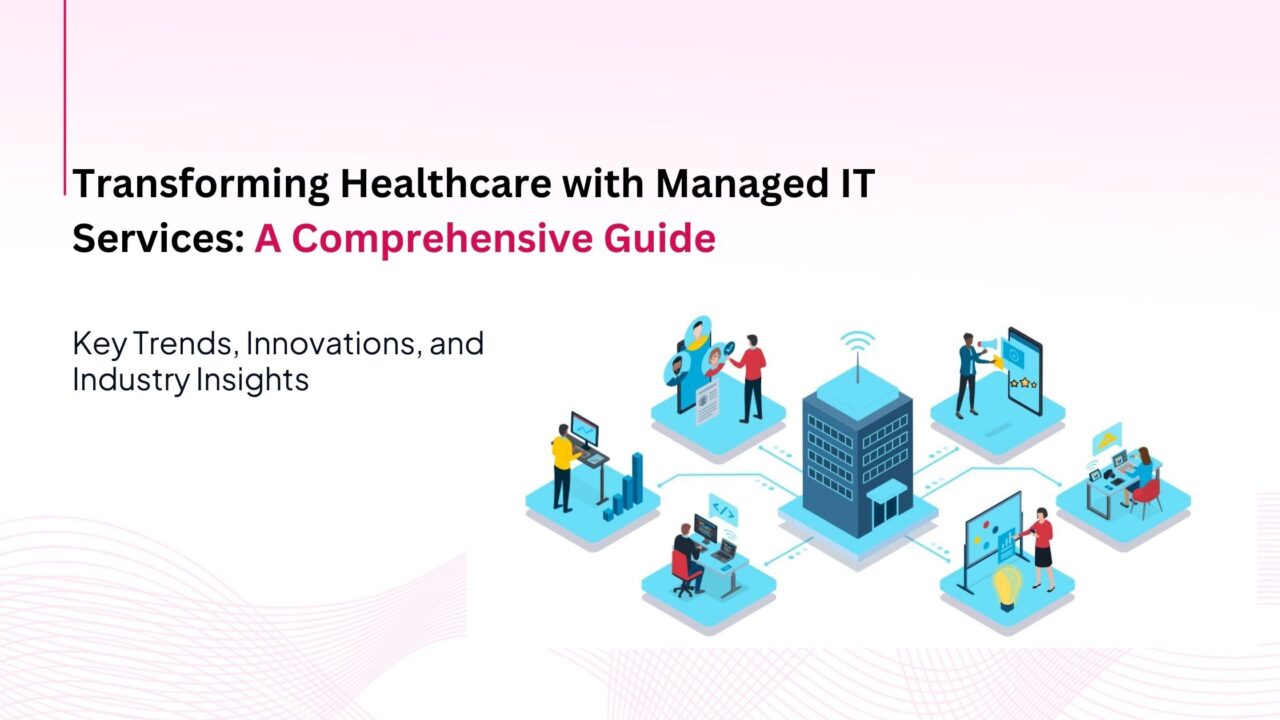The healthcare sector is navigating significant challenges, from rising operational complexities to increasing patient demands. Managed IT Services in Healthcare offer a robust solution, enabling healthcare organizations to streamline processes, enhance patient care, and build future-ready infrastructures. If you’re not convinced yet, consider this: the global healthcare IT industry is projected to grow from $420.23 billion in 2024 to $834.35 billion by 2029, reflecting a compound annual growth rate of 14.7% (source).
For deeper insights into digital health and AI transformations, explore our article here.
Why Managed IT Services Are Crucial for Healthcare
Healthcare facilities rely on IT systems to ensure seamless operations, from patient record management to telehealth services. Managed IT services help address operational inefficiencies, bolster security, and ensure compliance with stringent healthcare regulations.
Key Benefits of Managed IT Services
- Improved Interoperability: Managed IT services create seamless communication between EHRs, lab systems, patient portals, and telehealth platforms. By integrating these systems, healthcare providers ensure real-time data sharing, faster diagnoses, and reduced errors.
- Enhanced Data Security: Cybersecurity threats are a growing concern in the healthcare industry. Managed IT services implement proactive measures, such as real-time threat detection, data encryption, and compliance with regulations like HIPAA, safeguarding patient data from breaches and ransomware.
- Operational Efficiency: Automating repetitive tasks like appointment scheduling, billing, and inventory tracking reduces administrative burdens. This optimization allows healthcare professionals to focus on patient care rather than operational bottlenecks.
- Cost Efficiency: By outsourcing IT functions, healthcare organizations reduce the need for extensive in-house teams. This model provides access to top-tier IT expertise while cutting costs related to hiring, training, and infrastructure maintenance.
- Scalability and Flexibility: Managed IT services ensure healthcare organizations can scale their IT systems as patient volumes and technological demands grow. This adaptability ensures continuous service delivery without major infrastructure overhauls.
Key Use Cases of Managed IT Services in Healthcare
1. Electronic Health Record (EHR) Management
- Challenge: Managing and securing patient records across facilities.
- Solution:
- Regular updates, system optimization, and HIPAA compliance.
- Streamlined access to accurate patient data for quicker diagnoses.
- Impact: Minimizes system downtime, enhances data accuracy, and ensures regulatory compliance.
2. Telehealth Infrastructure
- Challenge: Ensuring seamless and secure virtual consultations.
- Solution:
- IT support for telehealth platforms with secure connectivity and scalability.
- Integration with EHRs for real-time data sharing.
- Impact: Reduced technical disruptions and expanded access to virtual care.
3. IoT Device Integration
- Challenge: Managing wearable devices for real-time patient monitoring.
- Solution:
- Securely connecting IoT devices to healthcare networks.
- Enabling predictive maintenance to prevent device failures.
- Impact: Improved patient outcomes through continuous monitoring and proactive alerts.
4. Cloud-Based Solutions
- Challenge: Handling massive amounts of healthcare data securely and efficiently.
- Solution:
- Migration to cloud platforms for storage and disaster recovery.
- Scalable solutions for growing patient data and operations.
- Impact: Cost savings, reliable backups, and uninterrupted services during emergencies.
5. Cybersecurity Measures
- Challenge: Safeguarding sensitive healthcare data from cyber threats.
- Solution:
- Advanced encryption, real-time threat detection, and regular risk assessments.
- Impact: Preserves patient trust and ensures adherence to regulatory standards.
6. Data Analytics and AI Integration
- Challenge: Utilizing data for better decision-making and personalized care.
- Solution:
- Integration of AI to predict patient outcomes and optimize operations.
- Impact: Drives better clinical results and reduces operational costs.
Real-World Examples
- Apollo Hospitals & Google Cloud Partnership:
- Use Case: Apollo Hospitals collaborated with Google Cloud to improve healthcare accessibility through their digital platform, Apollo 24/7.
- Outcome: Expanded telehealth services to rural areas, improved decision-making with AI-driven analytics, and enhanced patient engagement.
- Mayo Clinic & IBM Watson Health:
- Use Case: Leveraged IBM Watson Health for predictive analytics and EHR management.
- Outcome: Enhanced clinical decision-making and operational efficiency, freeing up resources for better patient care.
How Cosnet Powers Smarter Healthcare
At Cosnet, we specialize in Managed IT Services in Healthcare to create smarter and more efficient systems. Our tailored IT solutions ensure seamless system integration across EHRs, telehealth platforms, and IoT devices. By implementing robust data security measures, we safeguard sensitive patient information while enhancing trust and compliance. Additionally, our AI-driven analytics provide predictive insights that optimize operations and improve patient care.
Partner with Cosnet to revolutionize healthcare through innovative IT services and shape a future of operational excellence and enhanced patient outcomes.



